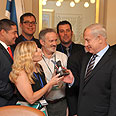
Netanyahu: Clear red line could mitigate conflict
PM allows diplomacy to take center stage as part of what appear to be bilateral US-Israeli attempts to dissipate tension over Iran strike; US denies report about secret communication with Tehran
After several weeks of public wrangling, both Jerusalem and Washington appeared to be making efforts to dissipate the tension over a possible Israeli strike on Iran's nuclear facilities.
In hopes placating Israel and forestalling the attack, the Obama administration moved forward with a series of steps meant to force the Iranians to take the stalled negotiations about its atom program more seriously, the New York Times reported Monday.
Related articles:
- Op-ed: Israeli demands from Obama
- France: Israeli strike on Iran could backfire 'Iranian drill aims to explore S-300 alternatives' WH: US, Israel in agreement on Iran
The White House also denied an Israeli newspaper report that accused Washington of secretly negotiating with Tehran to keep the United States out of a future Israel-Iran war.
"It's incorrect, completely incorrect," White House spokesman Jay Carney told Reuters while accompanying President Barack Obama on a campaign trip in Ohio. "The report is false and we don't talk about hypotheticals."
Yedioth Ahoronoth said Washington had approached Tehran through two unidentified European countries to convey the message that the United States would not be dragged into fighting if Iran refrained from retaliating against US interests, including its military in the Gulf.
Clear red line
Concurrently, Prime Minister Benjamin Netanyahu seemed to have altered his own rhetoric, starting with a call on the international community to draw a line that would convince Iran it was determined to prevent Tehran from obtaining nuclear arms. The leader made the remarks during a Cabinet meeting on Sunday.
Netanyahu reiterated the stance on Monday while meeting with American and Israeli war veterans. He said that the "cruel regime" in the Islamic Republic is forging on with its nuclear program because it has yet to be presented with "a clear red line." He urged the international community to show its determination against the Iran's nuclearization in order to minimize the risk of conflict.

PM with war veterans (Photo: Moshe Milner, GPO)
The military option is yet to be taken off the table, but for the first time in months the prime minister has allowed diplomacy to take center stage. While Israeli statesmen have alluded to sanctions and talks as the solution that could prevent an attack, Netanyahu maintained a combative narrative that all but deemed diplomacy obsolete.
"The goal is to make Iran understand that the world is serious about the military option," a source in Jerusalem said, noting that a clear message to that effect, if made by Obama, could be put off a strike for several month.
Officials in the capital postulate that Netanyahu has realized that "the time has come to get off his high horse. The tension and the public spat over the media isn't doing any good."
According to the officials, the US has been waging an intensive psychological battle against an Israeli operation over the past few weeks, which included media leaks and effectively de-legitimized a military move by the Jewish state. The bottom line was delivered by Chairman of the Joint Chiefs of Staff General Martin Dempsey, who went as far as to say that he does not want "to be complicit if they (Israel) choose to do it."
Meanwhile, Israel continues to trace the impact of the financial sanctions on Iran. Intelligence information which was presented to decision makers recently revealed that the economic measures are leaving a dramatic mark on the Islamic Republic's economy, and are putting heavy pressure on the regime there.
The annual intelligence situation estimate is to be presented before the Secuirty Cabinet on Tuesday, and is expected to indicate that the Middle East is more unstable than it has been in the past, primarily due to the Islamization of countries in the region, with an emphasis on Egypt.
- Receive Ynetnews updates directly to your desktop










